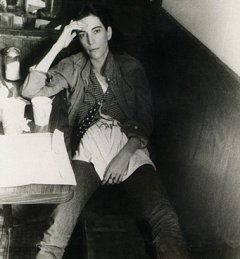Patti Smith
Smith was born in Chicago on December 30, 1946; her parents moved to Philadelphia when she was three, and then to the nearby, less urban town of Woodbury, NJ, when she was nine. Something of an outcast in high school, she found salvation in the poetry of Arthur Rimbaud, the writings of the Beats, and the music of soul and rock artists like James Brown, the Rolling Stones, the Doors, and especially Bob Dylan.
Saving enough money to move to New York City in 1967, she found work in a bookstore. Here she met future photographer Robert Mapplethorpe, whom she moved into the Chelsea Hotel with. Soon Smith became involved with underground theatre, not to mention playwright Sam Shepard; she co-authored and co-starred with him in the somewhat autobiographical play Cowboy Mouth in 1971. During this time, she was also working on her poetry, and met guitarist Lenny Kaye. When Smith gave a public poetry reading in February 1971, she invited Kaye to accompany her on the electric guitar. Over the next two years, Smith continued to perform in plays and poetry readings; and began contributing lyrics to the literary-minded metal band Blue Öyster Cult. She and Kaye performed again in late 1973, and their partnership grew into a much more regular occurrence. The following year, they added pianist/keyboardist Richard Sohl, in June 1974, the band cut the independent single, "Hey Joe" b/w "Piss Factory." Both songs featured Television guitarist Tom Verlaine.
A regular at CBGB's during the early days of New York punk, she was the first artist of the bunch to land a record deal and release an album.
She entered the studio with ex-Velvet Underground member John Cale serving as producer, and in late 1975 released her debut album, Horses, which was essentially the first art-punk album.
In 1978 came Easter, a more accessible nod in the direction of album rock radio, which featured Smith's writing collaboration with Bruce Springsteen, "Because the Night."
1979's Wave found Smith's sound becoming increasingly polished, thanks in part to new producer Todd Rundgren; however, many reviewers found it her least developed set of material. Smith had begun a relationship with MC5/Sonic's Rendezvous Band guitarist Fred "Sonic" Smith; Wave's "Dancing Barefoot" and "Frederick" were both dedicated to him. The couple married in 1980, and Smith retired to a life of domesticity near Detroit, raising two children with her husband. She continued to write, however, completing a poetry collection called Woolgathering (among other projects), and gave occasional readings.
At the end of 1994, Smith lost tragically lost her husband and her brother Todd. A stricken with grief Smith returned to performing as a means of therapy, and re-formed the Patti Smith Group — with Kaye, Daugherty, and new bassist Tony Shanahan — for a few small-scale tours aimed at reconnecting with her audience and reorienting herself to the concert stage. In 1996, the group entered the studio and recorded Gone Again, which featured a new second guitarist in Oliver Ray and guest spots from Tom Verlaine, John Cale, and Jeff Buckley. Gone Again took a stronger, more optimistic tone than might have been expected, and was well received by many critics. Following closely on its heels, Peace and Noise appeared in 1997, and earned a Grammy nomination for the track "1959"; Horses received the deluxe 2CD treatment in 2005 when it was reissued by Arista in a "30th Anniversary Legacy Edition". Smith continues to perform and inspire - also in 2005 Smith has curated the Meltdown festival at the RFH showcasing not just some of her favourite m usic but also poetry.
